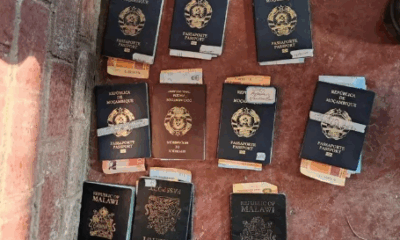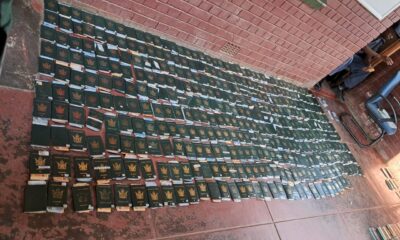News
Corrupt No More? Home Affairs Cleans House in 97-Year Crackdown on Fraud

From forged passports to fake marriages, the rot is being cut one conviction at a time.
For years, the Department of Home Affairs has been whispered about as one of South Africa’s softest spots, a place where a few hundred rand could get you a new identity, a fake marriage, or even a passport to a new life. But if Minister Leon Schreiber has his way, that chapter may finally be coming to an end.
Since stepping into the role in July 2024, Schreiber has turned the department’s once passive posture into an aggressive pursuit of justice. And the results? Hard to ignore.
The Numbers Tell the Story
Twenty-seven corrupt officials shown the door. Eight already behind bars, serving sentences that add up to a jaw-dropping 97 years. And 19 more prosecutions still underway.
That’s not just paperwork. That’s real-time accountability.
“Officials who fail to heed this message will soon find themselves out of Home Affairs and on their way to prison,” Schreiber warned in a no-nonsense tone that’s fast becoming his trademark.
The crackdown didn’t stop with public servants. Investigations since September 2023 have uncovered entire fraud syndicates, leading to arrests of not only officials, but also South African citizens and foreign nationals involved in criminal networks trafficking in fake IDs, bogus marriages, and fraudulent visas.
Fake Marriages, Dodgy Passports, and Bribes
Home Affairs isn’t just dealing with lazy staff or red-tape slipups. These are carefully orchestrated crimes.
Among the offenses that got officials fired:
-
Granting ID documents to people who didn’t qualify
-
Registering fake marriages to foreign nationals
-
Issuing passports under false names
-
Abusing birth certificate and visa processes
-
Sexual harassment in the workplace
One official was not only sentenced to 10 years behind bars, but also ordered to pay back every cent of the bribes he pocketed.
A Department in Detox Mode
The Department of Home Affairs, long a source of citizen frustration, now seems determined to fix its battered reputation. In April 2025 alone, six more officials were dismissed for various fraudulent acts, while others received final written warnings some even had their salaries docked.
It’s a cultural shift happening in real time, and one driven by data. Schreiber says the department’s Counter Corruption Unit uses advanced data analytics to spot suspicious patterns, detect fraud attempts early, and launch targeted investigations.
“The recent arrests of persons linked to passport fraud syndicate activities are a direct result of ongoing risk profiling,” he said.
Public Reactions: Skeptical But Hopeful
On social media, the news was met with cautious optimism. “Finally some real action. Let’s hope it’s not just window dressing,” wrote one user on X (formerly Twitter). Others questioned whether this cleanup will reach all corners of the department or stop with a few headline-making firings.
The broader public sentiment is clear: South Africans are tired of watching corrupt officials get away with impunity. Schreiber’s approach, firm, fast, and unapologetic is striking a chord with a nation hungry for clean governance.
But Can the Momentum Last?
Let’s not forget, this isn’t the first time Home Affairs has promised to clean up. But unlike past efforts that fizzled out after a few disciplinary letters and a PR campaign, this round is backed by arrests, real jail time, and measurable changes in oversight.
Partnering with the Special Investigating Unit (SIU), Schreiber has pushed for accelerated investigations and prosecutions, warning that delays will not be tolerated.
“My message to remaining perpetrators is clear: it is only a matter of time before we catch you,” he said.
What Comes Next?
If the department can sustain this momentum, we may be witnessing one of the most impactful public sector cleanups in recent years. But sustaining it means going beyond individual dismissals, it requires systemic change, better training, improved internal checks, and stronger whistleblower protections.
For now, though, South Africans can take a small win. For every bribe that no longer buys a passport and every scammer who lands behind bars, the department edges closer to what it was always meant to be: a service for the people, not a playground for criminals.
And that’s a future worth fighting for.
{Source: My Broad Band}
Follow Joburg ETC on Facebook, Twitter , TikTok and Instagram
For more News in Johannesburg, visit joburgetc.com


























